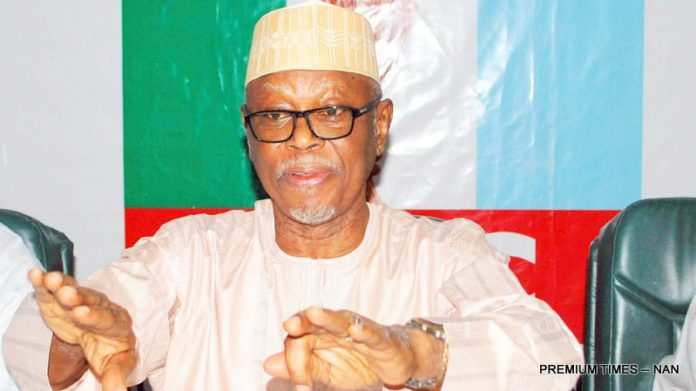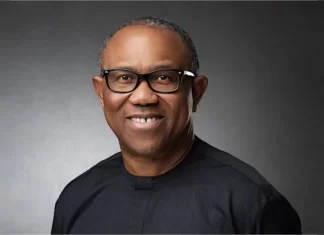By Emeka Alex Duru
Even with the 24 governors on the platform of the All Progressives Congress (APC), advertising solidarity with President Muhammadu Buhari against one year tenure extension for John Odigie-Oyegun and members of his National Working Committee (NWC), the envisaged crisis in the party, may not have been totally averted.
Perceptive analysts, rather, predict more heady days ahead for the ruling party that still seems lost on what to do with power, three years after election.
The governors had in a meeting, last Wednesday, April 4, backed the President, on the NWC not getting an extension at the expiration of its first term, on June 30.
Their new position, was a fall-out of Buhari’s rejection of the tenure elongation for the NWC, at the National Executive Council (NEC) meeting of the party on March 27.
Tenure elongation for Oyegun, others
A Special NEC of the party, had recommended the extension at its earlier meeting on February 27, on the promptings of the 36 state chairmen of the party. Buhari and the governors, were, incidentally at the meeting.
The main consideration for the extension was that given the limited time left for preparations for the 2019 general elections, going through the rigours of state congresses, national convention and likely disputations that may arise from the exercises, may work against the interest of the party.
It was thus, reasoned that allowing the current leadership to hold till June 30 next year, by which time the elections must have taken place, remained the best option.
The suggestion looked good, on the surface. But reactions from various tendencies within the party, after wards, indicated that some stakeholders, were quite uncomfortable with the agenda.
Fears over extension
The governors, were for instance, seen to be displaced by the extension, as the move appeared to have taken away the control of the party from them, in their various states.
Some, who are serving out their terms but have eyes in other offices, especially the Senate, saw themselves at the mercy of the state executive councils.
There were also insinuations that with the extension, the NWC may have been granted a greater measure of independence that may see it being used against the second term ambition of the President.
But perhaps, more than these considerations, there were fears that the tenure extension may not be in line with the constitution of the party, in which case, any nomination or primary conducted by the NWC, may end up being declared illegal by the courts.
Our reporter gathered that it was this particular observation which was said to have been raised by former Lagos State governor, Bola Tinubu, that made Buhari change his mind on the party handing Oyegun and his team another one year in office.
Buhari rejects extension
At the meeting of the party’s NEC on Wednesday, therefore, rather than addressing the main issues of the day, which Oyegun said would centre on APC constitutional amendment and the reports on true federalism, Buhari veered into the tenure extension matter that appeared to have been settled.
He stoutly opposed the extension, stressing that it is unconstitutional, illegal, and “contravenes both the APC constitution and the constitution of the federal republic of Nigeria.”
The president argued that “while the APC constitution in article 17 (1) and 13 (b) limits the tenure of elected officers to four years renewable by another election, the 1999 constitution of Nigeria as amended, in section 223 also proscribed periodic election for party executives at regular intervals which must not exceed four years.’’
He added that article 31 of APC constitution provides that any principal officer wishing to re-contest or contest for another post, must resign from his current post at least one month before the election.
“In this circumstance, what is expected of us is to conduct fresh election once the tenure of the current executive approaches its end,’’ Buhari had advised.
Tinubu regains voice
That was what former Lagos governor needed to bounce back to reckoning in the party’s politics.
Certain developments in APC, had lately, portrayed him as having lost out in recurrent power game in the party, particularly on the supremacy battle between him and Oyegun
At the inauguration of the National Assembly (NASS), for instance, Tinubu was recorded to have been humiliated when the members on the ticket of APC, went against his permutations and selected principal officers that were not those proposed by the party.
Contrary to Senator Ahmed Lawan and Femi Gbajabiamila, who the former Lagos governor and the party leadership had anointed as Senate President and Speaker of the House of Representatives, respectively, the legislators settled for Senator Bukola Saraki and Yakubu Dogara for the two chambers.
Tinubu, was said to have recommended sanctions against the legislators, but Oyegun seemed too reluctant in moving against them, preferring due process in the exercise.
Allegations were therefore, raised that he was tacitly in support of the lawmakers. Suspicions were that the insinuations of betrayal and anti-party activities, were stoked against Oyegun apparently to get him on collision course with President Buhari. He however survived the trap.
But the national chairman was later to be at odds with Tinubu over the 2016 Ondo governorship election.
At the party’s primary, it was alleged that the delegates’ list was doctored to favour Rotimi Akeredolu by some persons, principally, to stop Tinubu’s preferred choice, Segun Abrahams.
Tinubu’s attempts at getting the special appeal panel of the party to upturn the results of the primary and order a rerun, had almost sailed through when the NWC, led by Oyegun, insisted that there were no convincing reasons to repeat the exercise.
Pained that he had been unjustly treated and humiliated by the party he helped into being, Tinubu accused Oyegun of being the mastermind of his fate. He promptly fired a memo, accusing the national chairman of incompetence and demanding his resignation.
Perhaps, Tinubu had in the exercise, attempted to mobilise Buhari against the chairman. But that did not work. If anything, Buhari attended Akeredolu’s rally days to the election, in which he won.
The last encounter between the two was the accusation by Tinubu against Oyegun, of frustrating the efforts of his committee charged with reconciling aggrieved members of the party.
The dust raised by the allegation was yet to be cleared, when the party’s Special NEC, on February 27, recommended tenure extension for Oyegun and his team. Many saw in the recommendation, a very heavy blow on Tinubu’s standing in the party.
But with the current turn of events, Jagaban Borgu, as Tinubu is referred to by his teeming supporters, may have regained his voice.
In his prompt reaction to the President’s position on the matter, Tinubu, described it as a wise decision, arguing that the “action will also serve to strengthen the party by allowing party members, including present incumbents, to seek to contribute to the party by vying for executive offices as they see fit”.
TheNiche also learnt that the Lagos chapter of the party, where he commands overwhelming influence, is excited at news of the President’s position and follow-up actions by the governors.
How far will APC go?
What however remains uncertain, is how far the Buhari intervention will go in repositioning the APC for the 2019 politics. For a party that has literally fluffed the goodwill it had enjoyed while coming to power three years ago, it may have to do more than electing new national officers, in winning the confidence of the people, again.
The fear is that in a system where winning a national office in a ruling party is automatically seen as a meal ticket and a loss, amounting to relegation to the back waters in the scheme of things, the disagreements and contentions that may trail the congresses and national convention before and after, may lead to further polarization of the APC.
This is especially as the party is not known to have evolved any comprehensive philosophy at molding its various blocs into one united whole.
It is therefore, estimated that unless deft political moves are applied in the workings of APC in the days ahead, the hardly disguised tendencies in the party, may come into play in signaling huge crisis that may engulf it ahead 2019 politics.














